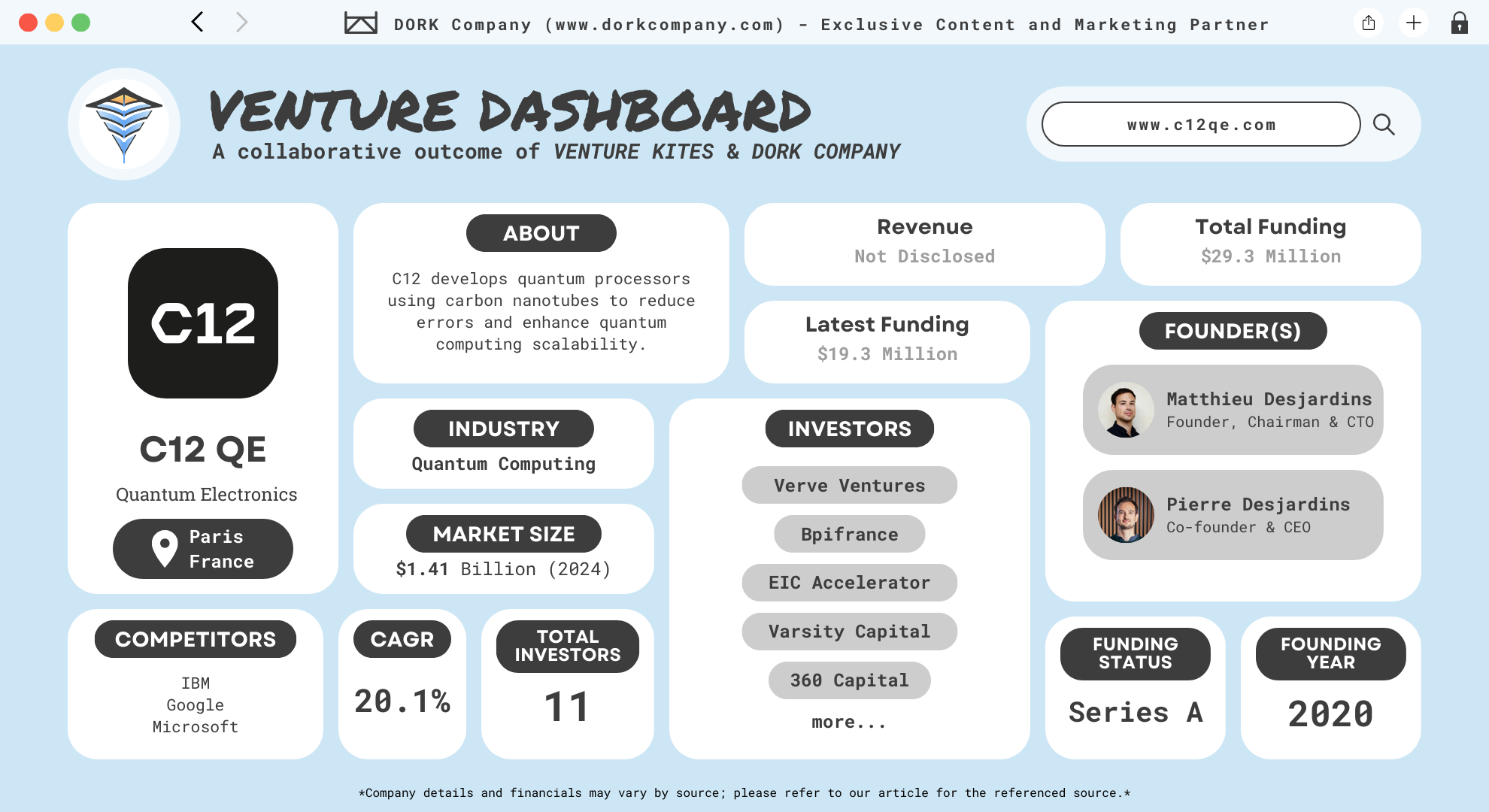C12 Quantum Electronics : A Quantum Leap for Quantum Computers

C12 is a revolution wrapped in carbon nanotubes. Founded in early 2020 by Matthieu and Pierre Desjardins, C12 Quantum Electronics emerged from the prestigious corridors of the Physics Laboratory of the École Normale Supérieure in Paris. C12 Quantum Electronics develops cutting-edge quantum processors powered by nanotubes. (C12 Quantum Electronics)
Carbon nanotubes allow for more stable and coherent quantum states, which are crucial for the effectiveness of quantum computing. In simpler terms, they’re building the brain of tomorrow’s computers, capable of performing complex calculations that are currently out of reach for today’s technology.
While most quantum computers struggle with error rates and quantum noise, C12’s technology dramatically reduces these issues. Their patented nano-assembly process places ultra-pure nanotubes onto silicon chips, ensuring that these processors aren’t just powerful, but also reliable and scalable.
C12 is leading the charge in a field that’s set to redefine industries—from pharmaceuticals to cryptography. As they continue to innovate and push the boundaries of what quantum computing can achieve, the potential to solve some of the world’s most pressing challenges becomes increasingly tangible.
Twin Pioneers: The Desjardins Duo’s Quantum Vision
Twins with a Quantum Dream—that’s the story of Matthieu and Pierre Desjardins, the masterminds behind C12 Quantum Electronics. Born from a groundbreaking idea in the Physics Laboratory of the École Normale Supérieure in Paris, these brothers turned their quantum visions into reality in 2020. (Matthieu Desjardins)
Who are the Desjardins twins?
Matthieu and Pierre Desjardins are innovators with a profound passion for quantum physics and a deep understanding of its potential. Their journey began long before C12, nurtured by years of academic excellence and research. Both brothers boast a solid foundation in physics, contributing significantly to their ability to lead a startup in such a complex field. (Pierre Desjardins)
The Spark of C12
The idea for C12 was ignited by breakthrough research conducted under the guidance of Takis Kontos, a leading researcher at the École Normale Supérieure. The Desjardins twins were deeply involved in developing a new quantum technology using carbon nanotubes during their time in the lab. This innovative approach showed promising results, which led them to spin off their project into what is now C12 Quantum Electronics.
Launching the Dream
In January 2020, the twins officially launched C12 in Paris, France as a spinoff of École Normale Supérieure, marking a significant milestone in quantum computing. They assembled a team of top-tier experts in quantum electronics and carbon nanotube science, including scientific advisors renowned for their work in spin qubits. (École Normale Supérieure)
Bits and Qubits: Sizing Up the Quantum Computing Market
The quantum computing market has been growing steadily, driven by advances in quantum hardware, software, and the increasing demand for high-performance computing. As we navigate 2024, the market for this high-tech wizardry is exploding, expected to soar from a substantial $1.41 billion to an eye-popping $4.24 billion by 2030 growing at CAGR of 20.1% (Grand View Research).
Investors are taking note of these global shifts. Despite a 50% drop in tech investments, quantum computing managed to attract a whopping $1.2 billion from venture capitalists in 2023, underscoring the confidence in its lucrative future. This enthusiastic financial backing is matched by significant public sector investments, particularly from nations viewing quantum computing as a cornerstone for future economic growth and national security (BCG Global).
This growth is fueled by the potential applications of quantum computing across various sectors such as cryptography, drug discovery, financial modeling, and artificial intelligence. However, the path to widespread quantum adoption isn’t without its challenges. The technology is still in its infancy, with many quantum computers today struggling with issues like error rates and noise. These hurdles make it difficult for quantum computers to scale and perform consistently
That’s where companies like C12 Quantum Electronics come in. By focusing on innovative approaches such as using carbon nanotubes for quantum processors, C12 is addressing some of these fundamental challenges head-on.
The competition in the quantum computing market is fierce. Major tech giants like IBM, Google, and Microsoft are all vying for dominance, each with their own unique approach to quantum computing. The future of quantum computing is bright, but the road ahead is challenging. As more companies enter the fray, innovation will be the key differentiator.
Carbon Copy: C12’s Vision for a Quantum Revolution
Founded on the principle of pushing the boundaries of technology, C12 aims to spearhead the next revolution in quantum computing by harnessing the power of carbon nanotubes.
Mission and Vision
C12’s mission is bold and straightforward: to power the next revolution in computing. Their vision is to transform the quantum computing industry by developing highly scalable and error-resistant quantum processors, providing the world with the tools needed to tackle challenges that are currently beyond our reach.
Solving Critical Problems
One of the biggest challenges in quantum computing today is the high error rate and quantum noise in existing systems. These issues severely limit the practical applications of quantum technology. C12 addresses these problems with its cutting-edge nano-assembly technology, which utilizes ultra-pure carbon nanotubes to build more stable and reliable quantum circuits. This approach significantly reduces decoherence and operational errors, paving the way for more robust quantum computing applications.
Business Model
C12 operates on a research-driven business model. They focus on developing proprietary technology that can be licensed to other companies and integrated into broader systems. This model not only fuels innovation within the quantum computing sector but also allows C12 to collaborate with industry leaders and academic institutions to refine and advance their technology.
Nano Innovations: Small Tubes, Big Breakthroughs
This pioneering company is at the forefront of quantum computing, developing products and services that could transform how we approach complex problems across industries.
Quantum Processors
The flagship product of C12 Quantum Electronics is their advanced quantum processor built using carbon nanotubes. Its unique design significantly reduces quantum noise and error rates, providing a much more stable and reliable base for quantum computing operations. These processors are designed to be scalable, making them suitable for a range of applications, from drug discovery to complex financial simulations.
Services
Beyond their physical products, C12 offers a suite of services designed to facilitate the adoption and integration of quantum computing across various sectors. This includes consulting services for businesses looking to explore quantum solutions and tailored support for integrating quantum technologies into existing IT infrastructures.
Also, one of their key offerings is access to their quantum emulator, Callisto, which allows researchers and developers to simulate quantum circuits up to 13 qubits.This service is available in the cloud, making it accessible to a global audience. Callisto provides a valuable tool for those looking to experiment with quantum computing without needing access to physical quantum hardware. (Callisto)
Innovations
One of C12’s most groundbreaking innovations is their patented nano-assembly technology, which enables the precise placement of carbon nanotubes on silicon chips. This process is critical for creating high-fidelity quantum circuits that are essential for the effective operation of quantum processors. The company has also developed a unique method for minimizing decoherence, a common issue in quantum computing that leads to errors and reduces the efficacy of computations.
Features
The quantum processors developed by C12 boast several key features that set them apart in the crowded quantum computing market:
- Ultra-pure material: The use of carbon nanotubes ensures that the processors operate with minimal interference, which is crucial for maintaining the integrity of quantum computations.
- Scalability: The design of C12’s quantum processors allows for scaling up to thousands of qubits without significant increases in error rates or operational challenges.
- Reduced Decoherence: Their technology dramatically reduces the decoherence rate, making their processors more stable and reliable for complex quantum operations. (C12 Features)
Tube Tech: The Carbon Nanotubes Powering C12’s Quantum Brilliance
Their patented nano-assembly technology involves integrating ultra-pure carbon nanotubes onto silicon chips, forming the quantum circuits that are essential for their processors. The precision of this method ensures that the nanotubes are isolated from environmental factors, which significantly reduces quantum decoherence. (C12 Technology)
The carbon nanotubes themselves are a marvel of material science. Known for their exceptional electrical conductivity and mechanical strength, they provide an ideal environment for quantum states, allowing for more stable and coherent qubit operations. This is critical in quantum computing, where the integrity of quantum states directly impacts computational power and accuracy.
One of the standout features of C12’s technology is the way these nanotubes are employed within the quantum circuits. Suspended above an array of gate electrodes, the nanotubes are maximally isolated from any disruptive forces, ensuring pristine conditions for quantum operations. Additionally, C12’s technology allows for the embedding of hundreds of thousands of qubits on a single chip.
These nanotubes are extraordinary because of their electrical properties, which allow them to act as perfect quantum wires .C12’s quantum circuits are designed to maximize the potential of their carbon nanotube technology. The circuits combine spins to ensure long coherence times and use high-frequency microwave components for fast operations.
Market Impact: C12’s Ripple Effect in the Quantum Pond
C12’s quantum circuits are designed to maximize the potential of their carbon nanotube technology. The circuits combine spins to ensure long coherence times and use high-frequency microwave components for fast operations. These elements work together to create a hybrid quantum architecture that is both powerful and scalable
They’ve teamed up with leading research institutions and major players in the tech industry to enhance their quantum computing solutions. One of their key partnerships is with the European Innovation Council, which has played a crucial role in funding and supporting C12’s research and development.Beyond academia, C12 has forged partnerships within the industry that help integrate their quantum computing solutions into broader markets. One of the notable collaborations is with OVHcloud, with whom C12 launched a quantum emulator. (Quantum Emulator)
Quantum Capital: The Big Bucks Fueling C12’s Dreams
Funding Milestones
C12’s journey began with a solid financial foundation, thanks to their initial seed funding round. On June 8, 2021, the company raised $10 million in seed funding. This round was led by institutional investors like 360 Capital Partners and Airbus Ventures, along with BNP Paribas Développement. The seed round also attracted corporate backing from Bpifrance, a French public investment bank, and even angel investment from Octave Klaba, the founder and chairman of OVHcloud. (Tracxn)
In addition to their seed funding, C12 also secured undisclosed grant funding from Bpifrance on the same day. This grant further bolstered their financial position, enabling them to advance their research and development efforts. (Bpifrance)
Further Grants and Series A Funding
As C12 continued to innovate, they attracted more financial support. On June 15, 2022, the European Innovation Council (EIC) Fund awarded them a $2.6 million grant as part of its initiative to support breakthrough technologies. (EIC Fund)
The most significant financial milestone for C12 came on June 19, 2024, when they closed their Series A funding round, raising an impressive $19.3 million. This round was led by Varsity Ventures and Verve Ventures, with participation from the EIC Fund, 360 Capital Partners, and BNP Paribas Développement.
The Quantum of Solace: Reflecting on C12’s Trailblazing Journey
C12’s advancements in using carbon nanotubes for quantum processors have set a new benchmark in the field. Their technology doesn’t just promise faster computations; it opens a gateway to solving some of humanity’s most complex problems, from designing new drugs to solving intricate optimization problems.The potential impacts of their innovations extend far beyond the tech world, potentially transforming industries and enhancing our understanding of the quantum world. As C12 Quantum Electronics continues to push the boundaries of quantum computing, the watchful eyes of the tech world remain fixed on them.
If C12’s story teaches us anything, it’s that big ideas paired with the right support can change the world. Whether you’re a budding entrepreneur or a seasoned inventor, don’t underestimate the impact of your ideas. Take that first step, seek out partners who share your vision, and you could be the next big name in technology.
Curious about other revolutionary technologies or startup success stories? Head over to Venture Kites, where we dive deep into the latest trends, provide insights into the startup ecosystem, and profile companies that are breaking new ground.
At a Glance with DORK Company

Dive In with Venture Kites
Lessons From C12 Quantum Electronics
Addressing Industry Pain Points
The Lesson & Why it Matters: Focusing on solving significant industry pain points can position a company as a leader in its field and drive customer adoption.
Implementation: Engage with your target market to understand and address the most pressing challenges they face.
How C12 Quantum Electronics Implements It: C12 tackles the quantum computing industry’s challenge of high error rates by developing quantum processors that significantly reduce decoherence.
Harnessing Unique Materials
The Lesson & Why It Matters: Using novel materials can lead to breakthroughs in product capabilities and performance.
Implementation: Invest in research and development to explore the properties and applications of unconventional materials in your industry.
How C12 Quantum Electronics Implements It: C12 leverages carbon nanotubes for their quantum processors, enhancing qubit performance and reducing error rates.
Prioritizing Product Quality
The Lesson & Why It Matters: High product quality ensures reliability and customer satisfaction, which are crucial for gaining a competitive edge.
Implementation: Focus on enhancing the quality of the core components of your products.
How C12 Quantum Electronics Implements It: C12 uses isotopically purified carbon atoms in their nanotubes to minimize qubit decoherence, ensuring high-quality quantum processing.
Targeting Niche Markets
The Lesson & Why It Matters: Focusing on niche markets can help in developing specialized solutions that are highly valued.
Implementation: Identify underserved or emerging markets in your industry and tailor your products to meet their specific needs.
How C12 Quantum Electronics Implements It: C12 targets the quantum computing market, particularly applications in complex computing tasks that current supercomputers cannot handle.
Public Relations and Visibility
The Lesson & Why It Matters: Maintaining a strong public relations strategy increases brand visibility and attractiveness to investors.
Implementation: Leverage media, conferences, and other platforms to share your company’s achievements and vision.
How C12 Quantum Electronics Implements It: C12 utilizes its breakthroughs and funding milestones to maintain high visibility and attract further investments and partnerships.
Youtube Shorts
KitePod by Venture Kites
Author Details
Creative Head – Mrs. Shemi K Kandoth
Content By Dork Company
Art By Dork Company
Instagram Feed
X (Twitter) Feed
C12 is pioneering in quantum computing by developing quantum processors with carbon nanotubes to enhance scalability and reduce errors.
— Venture Kites (@VentureKites) October 6, 2024
Complete article @VentureKites : https://t.co/7MOC42zUor
Proudly crafted in collaboration with @dorkcompany_https://t.co/w7BPjtILBB pic.twitter.com/9PcVRlHd4d












